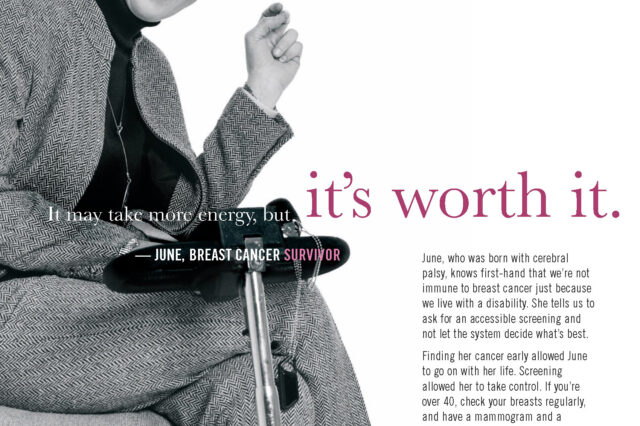New campaign encourages women with disabilities to get breast cancer screenings

New campaign encourages women with disabilities to get breast cancer screenings. Photo courtesy of CDC)
For June, a cancer survivor, the breast cancer screening process was an "ordeal." June was born with cerebral palsy, which makes remaining still for mammograms difficult. In the beginning it was hard to communicate her needs to health-care providers.
"So I finally found a provider who would listen to me," June said. "Once I found him I stayed with him for many years."
June is one of four breast cancer survivors with physical disabilities who share their stories in the new public health campaign, The Right to Know. A team from the Florida Office on Disability and Health at the University of Florida will lead the campaign in Florida. Designed to fill the need for breast health education materials targeting women with disabilities, The Right to Know was developed by the Centers for Disease Control and Prevention and will be launched initially in four states.
"The ultimate goal of the campaign is to encourage women with physical disabilities to get regular breast cancer screening in order to increase early cancer detection and potentially save lives," said Eva Egensteiner, M.A., C.P.H., the campaign project manager in the UF College of Public Health and Health Professions.
Last year in Florida, about 12,000 women were diagnosed with breast cancer and nearly 3,000 women died of the disease. Increased use of early detection measures, such as mammograms and clinical breast exams, have contributed to improved breast cancer survival rates. Yet women with physical disabilities are significantly less likely to receive breast cancer screening than women without disabilities, according to a study in the Journal of Cancer Causes and Control.
"The prospect of lower or less consistent screening rates puts these women at risk for late-stage diagnosis and poor health outcomes," said Allyson Hall, Ph.D., an associate professor in the department of health services research, management and policy. "This presents a significant public health concern, as the U.S. Census Bureau estimates that nearly one in five women in Florida is living with at least one disability."
The four women featured in The Right to Know campaign describe their personal experiences with breast cancer and encourage other women with disabilities to get regular screenings. The campaign materials, available in English and Spanish, include posters, fliers, print advertisements, audio files and a tip sheet with information on how women with physical disabilities can prepare for a mammogram. The UF team has also developed specific information to help Florida women with disabilities navigate through obstacles and get screenings.
The Right to Know campaign will run in Florida through 2012. For more information or to request the free materials, please visit the campaign Web site at rtk.phhp.ufl.edu, or call 352-273-5102.
About the author
